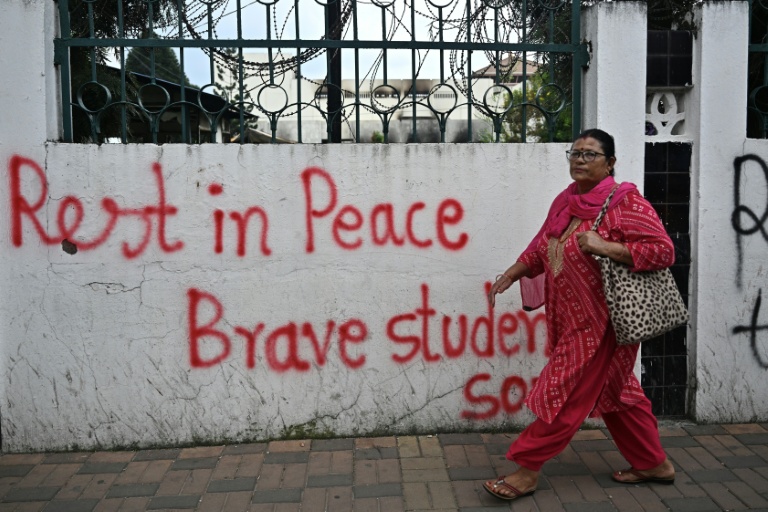University student Aditya Rawal was outside Nepal’s parliament with hundreds of other anti-corruption protesters when gunfire crackled and 14 people slumped down in front of him.
One was his university friend, and as he dashed forward to help — with his hands up — bullets smashed into him too.
“I heard somewhere that if you raise both hands, they will not shoot you,” Rawal, a 22-year-old digital marketer, told AFP as he lay on a bed in the capital Kathmandu’s Civil Service Hospital.
“But I was their target.”
At least 72 people were killed during chaos beginning on September 8, as youth protests under a loose “Gen Z” label rallied against a government ban on social media.
“There had been so many protests in Nepal by older people, but in our ‘Gen-Z’ protest, they used guns”, Rawal said.
A day later, protests escalated, driven by economic woes and anger at government corruption.
The veteran prime minister quit and parliament and key government buildings were set on fire, before the army seized back control.
It was the country’s worst unrest since the end of a decade-long civil war and the abolition of the monarchy in 2008.
On Friday, former chief justice Sushila Karki, 73, was sworn in as interim prime minister, tasked with steering Nepal to elections within six months.
– ‘Blood’ –
Nurse Usha Khanal, 36, said her gloves were “drenched with blood” as she treated the wounded, while tear gas fired nearby seeped into the hospital itself.
The Civil Service Hospital admitted 458 injured protesters; six later died, four of them under 30 — a stark reminder of the youth-led nature of the movement.
Rawal, his leg heavily bandaged and bullet fragments lodged in his arm and stomach, said he would do it again.
“If there is no change, we still have time to fight… We want a transparent government, no corruption and no dictatorship.”
One in five Nepalis aged 15–24 are jobless, World Bank data shows, with GDP per capita at just $1,447 in the Himalayan nation of 30 million.
Rawal’s cousin, 20-year-old Puja Kunwar, has remained by his bedside.
“His actions were for our nation,” she said. “It really gives me courage.”
– ‘Changes’ –
On the same ward, 19-year-old protester Subash Dhakal, shot in his knees, is likely to be largely bedridden for six months.
The sacrifices of those who died and were injured “should not be in vain”, he said.
“This has toppled the government and formed a new one… we don’t want the country to return to its earlier state”, he said.
His mother, government school teacher Bhawani Dhakal, 45, gave him money to take a bus to join the protests from their hometown, 30 kilometres (19 miles) away.
Dhakal said she had protested with other teachers against an education bill earlier this year, but that had resulted in nothing.
“It’s amazing that they brought change in just 24 hours,” she said. “Our sons threw out all the corrupt leaders.”
Subash Dhakal said he was proud of his role.
“I have no regrets at all,” he said.
“I have done it not only for me. It was for everyone, from my family to all brothers. This pain is ephemeral, but this will definitely bring about some changes.”
bur-grk/pjm/fox

